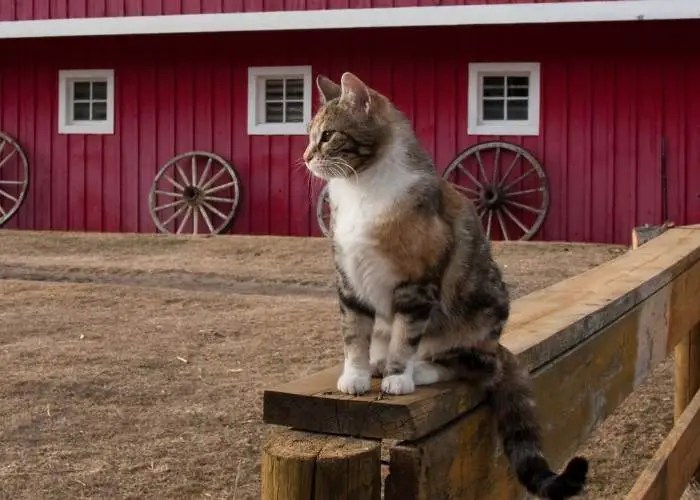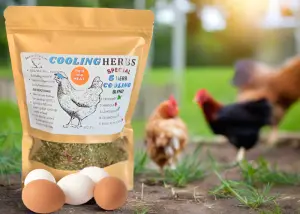
Can I own a cat and chickens? In most circumstances, cats and chickens can get along. With more and more families turning to owning backyard chickens, it makes it even more important to know what precautions need to be taken to protect your flock.
According to the most recent data and study(October 14, 2023) by the World Animal Foundation, 46.5 million U.S. families own a cat. Some of these households own more than one cat and a great majority of them are allowed to roam outdoors.
The following are 5 really important tips to help protect your chickens from not only your own pet cat, but any neighborhood cats as well.
1. Introducing Your Cat to Baby Chicks

It isn’t recommended to let your baby chicks around your cat without constant supervision. In fact, it is best to keep them separated by some hardware cloth. This way, they can see each other, but hardware cloth is too small for a cats paws to fit through.
If you don’t own a cat, but you want to let your baby chicks out for an afternoon field trip outdoors, constant supervision is recommended. You never know when a neighborhood cat will decide to hop the fence.
Domesticated cats still have natural instincts to hunt, stalk and pounce on their prey. Even if a cat does this in play, such as what they do with their toys, it can have detrimental effects on a young chick.
How to Introduce Your Cat to Baby Chicks
- Always keep your chicks separated from your adult cat by hardware cloth. Chicken wire is too large of an opening and a cat can easily put its paw through and grab a chick with its sharp claws.
- Bring your cat to the brooder to show them the chicks through the hardware cloth. Let them smell to get used to their scent.
- Let your cat watch you when you are tending to the chicks in the brooder.
- It isn’t recommended to let your cat “play” or intermingle with the chicks at this age. A cat can easily mistake a chick as a play toy and seriously injure or kill them. Wait until the chicks are full grown before letting them out with your cat.
2. Introducing Your Cat to Adult Chickens

Make Sure Your Cat is Routinely Fed
If your cat is not properly fed and frequently hungry, it is more likely to stalk, pounce and try to eat a chicken. So, make sure your cat is routinely fed.
Most pet cats that are raised around chickens will leave them alone. In many circumstances, the chicken is bigger than the cat and a flock of chickens can look rather intimidating.
Feral Cats and Chickens
It is feral cats that you need to worry about around your flock. Feral cats are not routinely fed and a nice plump chicken can make a wonderful meal for them. Feral cats will also help themselves to your chicken feed and water.
Once a cat knows where to get a good meal, it will return for more.
TIP: To deter chicken predators (including feral cats), keep your chicken feed and water inside the chicken run during the day and put it away each evening.
Introducing Your Cat to Adult Chickens
- Start with letting your cat get used to watching the chickens through chicken wire or a hardware cloth barrier.
- My adult cat will follow me out to the chicken run and just sit at the gate and watch me tend to the flock. I did this for a few months before letting the flock out while my cat was in the backyard.
- When you feel that your cat and chickens are ready to co-exist without a chicken wire wall separating them, constant supervision is necessary.
- Once you feel that they will be ok without you right there, you can leave them unattended.
- My adult cat, knows that the chickens are there and will give them their space when they are out free ranging in our backyard. I have even seen him chase off other cats or squirrels if they get too close to them!
3. Is Chicken Poop Toxic to Cats?
Yes, chicken poop can be toxic to cats if they eat it. There are a handful of diseases that can be passed from chicken poop to felines. There are also some diseases that can be passed to chickens from eating feline feces.
Salmonella
“Salmonella is a bacterial disease transmitted through chicken manure, raw eggs and either undercooked or raw chicken meat.”
Can Dogs Get Salmonella from Chickens?
Cats can contract salmonella from chickens! There are several different ways that a cat can contract salmonella from an infected chicken.
- eating chicken feces
- eating a chicken infected with salmonella
- by eating raw or undercooked eggs from a chicken with salmonella
- eating undercooked or raw chicken of a chicken with salmonella
Toxoplasmosis
Toxoplasmosis is caused by the Toxoplasma gondii parasite. It is transmitted by eating raw or undercooked meat that is infected with this parasite. It can also be transmitted by eating feces of an animal that has ingested contaminated meat.
Toxoplasmosis can be passed from cats to chickens and also from chickens to cats by the eating of each others feces. It is more common in feral cats and cats that are kept outdoors.
- Many cats that carry the parasite do not even show symptoms. They will shed the virus in their feces for about 1-2 weeks, develop immunity and then never get it again.
- Cats that are immunocompromised are more likely to become sick (show symptoms) with Toxoplasmosis.
- A chicken has to eat a large amount of infected feces to become ill with the T. gondii parasite.
Cats are more likely to pass this disease to chickens vs. chickens passing it to cats through their poop. This is because felines are the only known host of this parasite. (The parasite can replicate only in felines.)
Cats are known to hunt and eat rats, mice and birds that may be infected with the parasite. Once a cat eats the infected meat, it will shed the parasite in its feces for up to 2 weeks.
| SYMPTOMS OF TOXOPLASMOSIS IN CATS | SYMPTOMS OF TOXOPLASMOSIS IN CHICKENS |
|---|---|
| FEVER | WHITE DIARRHEA |
| LOSS OF APPETITE | WEIGHT LOSS |
| LETHARGY | SHRUNKEN COMB |
| EYE PROBLEMS | BLINDNESS |
| PNEUMONIA (BREATHING PROBLEMS) | DROP IN EGG PRODUCTION |
| HEPATITUS | TORTICOLIS (TWISTED NECK) |
| SEIZURES | TREMBLING |
| SWOLLEN LYMPH NODES | INCOORDINATION |
Other Disease that Cats Can Get from Chicken Feces
- E.coli
- Campylobacter
- Avian Influenza (bird flu)
- Tapeworms
- Histoplasmosis
4. Can a Cat Live in a Chicken Coop?

This may sound like a silly question, but the question, “Can a Cat Live in a Chicken Coop?” is asked often by owners of outdoor cats. Yes, it is ok to own a barn cat and allow it to live in the chicken coop with your adult chickens as long as you follow a few precautions:
Precautions for Barn Cats Being Raised With Chickens
- Barn cats should be spayed or neutered.
- Due to the possibility of spreading diseases to humans, barn cats need to remain outdoor cats.
- Barn cats need to be up to date on all feline shots for outdoor cats.
- Barn cats need to be fed daily.
- Put away all cat food and water bowls at the end of each day.
5. Benefits of Owning Barn Cats

If you own a flock of chickens, ducks, geese or maybe some pigs, goats or other livestock, adding a barn cat to the mix can benefit you in many ways.
Save a Shelter Cat from Being Euthanized
There are many cats in shelters that are likely to be euthanized unless they find a good home. Contact your local animal shelter to find out more information on how you can adopt a “barn cat” or “garden cat.” They are usually not as expensive to adopt.
Barn Cats Make a Great Organic Pest and Rodent Control
Cats love bugs of all sorts and will help to keep your bugs around your yard under control. It is also natural for them to stalk and eat their prey, such as rats and mice.
Barn Cats Can Save You Money in the Long-run

With a barn cat around, it is surely to help keep your pest and rodent population down, saving you from having to hire an exterminator and using harsh chemicals.
One less mouse or rat around means one less rodent eating your flocks food. In the long-run, this can save you a lot of money!
Barn Cats Can Protect Your Flock
Having a cat around can help to keep other predators and pests at bay. They can chase away feral cats, squirrels, mice, rats and other birds of prey.
CONCLUSION: Can I Own a Cat and Chickens?
- Cats natural instinct is to hunt, pounce and kill its prey. This is why baby chicks should never be allowed to mingle with cats. Even if a cat decides to “play” with the chick, it can accidentally severely injure or kill a baby chick.
- Let your cat smell the chicks scent through the hardware cloth of your brooder and let them be present when you are caring for your chicks.
- It is best to wait until your chickens are full grown to let them free range while your cat is out.
- Chicken poop may contain harmful bacteria and viruses that can be detrimental if passed on to your cat. Salmonella, E.coli and Toxoplasmosis are 3 common diseases that can be passed to a cat through chicken poop.
- Cats can live in a chicken coop with your chickens. It is important to follow safety precautions if you are going to do this and always keep your barn cat outdoors.
- There are many benefits to owning barn cats, the biggest being that they can help to keep your rodent and pest population down.







